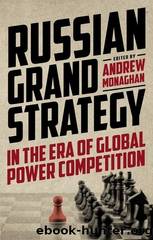Russian Grand Strategy in the era of global power competition (Russian Strategy and Power) by Andrew Monaghan

Author:Andrew Monaghan [Monaghan, Andrew]
Language: eng
Format: epub
ISBN: 9781526164636
Publisher: Manchester University Press
Published: 2022-04-25T16:00:00+00:00
Further reading
Russian thinking on the nature of future wars and the revolution in military affairs extends to early in the Soviet period, but the genesis of current thinking about sixth-generation warfare can be traced to Marshal of the Soviet Union Nikolai Ogarkov, the Chief of the General Staff of the USSR (1977â84). Michael Kofman provides a brief overview of technology and the revolution in military affairs in âThe Ogarkov Reforms: The Soviet Inheritance behind Russia's Military Transformationâ (Changing Character of War Centre Russia Brief No. 5, June 2019). A more detailed account of this history can be found in âNikolay Ogarkov and the Scientific-Technical Revolution in Soviet Military Affairsâ (Comparative Strategy, Vol. 6, No. 1, 1987, pp. 29â59) by Dale R. Herspring; âThe Origins of the RMAâ by Lawrence Freedman (The Adelphi Papers, Vol. 38, Issue 318, 1998, pp. 19â32); and âThe Methodology of Foresight and Forecasting in Soviet Military Affairsâ by Jacob W. Kipp (Foreign Military Studies Office, 1998).
Any serious study of future war and sixth-generation warfare should include extensive reading of the late Major General Vladimir Slipchenko. Perhaps one of the best works available is Future War (Fort Leavenworth, KS: Foreign Military Studies Office, 2007), an English translation of Budushchaya voyna (Moscow: Polit.ru, 2005), authored by Slipchenko and Makhmut Gareev, a World War Two veteran and president of the Russian Academy of Military Sciences until his death in 2019. Future War is not a book in the traditional sense but is instead a collection of lectures by Slipchenko and Gareev in 2004 and 2005, with questions and answers from those in attendance. The book generally explains the ânon-contact, long-range, precision warfareâ nature of future wars in a historical context. Slipchenko's âInformation Assets and Information Confrontation: Their Evolution, Role, and Place in Future Warfareâ, published in Army Digest in 2013, well after his death, explains not only the informational aspects of war, but also lays out Slipchenko's thoughts on seventh-generation warfare. Although Slipchenko's ideas evolved throughout his writing, Beskontaktnyye voyny (Non-contact wars) (Moscow: Izdatel'skiy dom Gran-Press, 2001) provides the foundation for his understanding of the evolution of warfare.
Slipchenko's work appears to have been continued by S. G. Chekinov and S. A. Bogdanov, who often co-author. A few of their more notable works include: âInitial Periods of Wars and Their Impact on a Country's Preparations for a Future Warâ (Military Thought, October 2012); âThe Nature and Content of a New-Generation Warâ (Military Thought, October 2013); âThe Features of Military Security in 21st Century Russia in Conditions of Globalizationâ (Military Thought, April 2016); and âThe Essence and Content of the Evolving Notion of War in the 21st Centuryâ (Military Thought, January 2017).
Perhaps the best exegesis of Russian views on future war and sixth-generation warfare is provided by Tim Thomas. He is adept at capturing the thoughts of past and contemporary Russian military theorists and placing them in the appropriate context. Thomas's work is particularly valuable for non-Russian speakers, as many of his sources can only be found in Russian or are difficult to find in English.
Download
This site does not store any files on its server. We only index and link to content provided by other sites. Please contact the content providers to delete copyright contents if any and email us, we'll remove relevant links or contents immediately.
| Arms Control | Diplomacy |
| Security | Trades & Tariffs |
| Treaties | African |
| Asian | Australian & Oceanian |
| Canadian | Caribbean & Latin American |
| European | Middle Eastern |
| Russian & Former Soviet Union |
The Secret History by Donna Tartt(19085)
The Social Justice Warrior Handbook by Lisa De Pasquale(12190)
Thirteen Reasons Why by Jay Asher(8909)
This Is How You Lose Her by Junot Diaz(6885)
Weapons of Math Destruction by Cathy O'Neil(6279)
Zero to One by Peter Thiel(5801)
Beartown by Fredrik Backman(5752)
The Myth of the Strong Leader by Archie Brown(5507)
The Fire Next Time by James Baldwin(5442)
How Democracies Die by Steven Levitsky & Daniel Ziblatt(5218)
Promise Me, Dad by Joe Biden(5153)
Stone's Rules by Roger Stone(5087)
A Higher Loyalty: Truth, Lies, and Leadership by James Comey(4960)
100 Deadly Skills by Clint Emerson(4924)
Rise and Kill First by Ronen Bergman(4788)
Secrecy World by Jake Bernstein(4752)
The David Icke Guide to the Global Conspiracy (and how to end it) by David Icke(4717)
The Farm by Tom Rob Smith(4507)
The Doomsday Machine by Daniel Ellsberg(4490)
